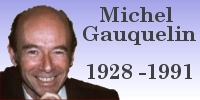|
Suitbert Ertel (b. 2 March 1932, Radevormwald, Rhein-Wupper-Kreis, Germany) is an eminent statistician and psychologist. He is Professor Emeritus of Georg-August-University of Göttingen, Germany. Since 1976, his systematic and investigative studies into unorthodox fields relating to psychology have led to controversy in particular with the astrological evidence from French statistician, Michel Gauquelin and the Carlson Test.
Academic History
Ertel obtained his Ph.D. in Psychology at the University of Münster in 1963. In 1971, he became Professor of Psychology at the University of Göttingen.
Areas of Research
Initially his studies focussed on psycho-linguistics, personality and individual and cultural differences. From 1976, his studies moved into investigation and testing claims in the field termed para-psychology. These included solar activity in relation to human behaviour, the morphic resonance claims of Dr Rupert Sheldrake and astrological phenomena such as the Gauquelin effect and more recently the renowned Carlson Double Blind Astrology Experiment.
Specialist Interests
- Personality.
- Differential Psychology.
- Psycho Linguistics.
- Psycho Semantics.
- Semantic Differential.
- Impression Differential.
- Content analysis.
- DOTA (Dogmatism Text Analysis.
- Psychometrics.
|
|
- Factor analysis.
- Simple Structure.
- Varimin rotation.
- Connections between Psychology and
- Sociology.
- History.
- Biology.
- Evolution.
- Systems Theory.
|
|
Research into Gauquelin & the Mars Effect
In 1985, Ertel started an investigation into one of several claims by French statistician, Michel Gauquelin. Gauquelin claimed there was a correlation between the position of Mars at birth and eminence within certain fields. Ertel demonstrated that the effect was highly significant and to a level that could not be accounted for by chance factors.
"It is concluded that in view of the evidence corroborating the mars effect, 40 years after its first claim by Michel Gauquelin (1955), the phenomenon demands recognition as scientific fact by the skeptic committees as well as by mainstream science." ~ Suitbert Ertel. The Tenacious Mars Effect (1996) p.SE-2
Ertel co-wrote, The Tenacious Mars effect (1996), with American researcher and editor, Kenneth Irving. In this publication, they were able to publish the extensive results and to document the history of the dispute between Gauquelin and his critics among sceptical groups in France, Germany and CSICOP in the USA.

Unable to account for these extraordinary results, sceptical organizations such as GWUP Gesellschaft zur Untersuchung parawissenschaftlicher Phänomene (Society for the Study Paranormal Phenomena) claimed that Ertel, a psychologist favoured astrology to the extent that he must have deliberately manipulated the results. However, Ertel refuted this by showing that he was well-known for discovering errors in Gauquelin's data and statistical analysis in the past. Nevertheless, when the accumulated results from all the sceptical groups were compiled with Gauquelin's 'clean' data, the combined results showed the Mars Effect to be even more significant than Gauquelin's original claims. To date, no one has been able to account for these results which appear to suggest that astrology may have a scientific basis.
An ardent critic of astrology and CSICOP fellow, Geoffrey Dean has claimed that parents in various countries must have deliberately falsified the birth times of their children. There is no evidence to support his claim. What is mystifying is why would any parent go to the trouble to ensure that Mars, a planet that was at the time considered 'malefic' was located on one side of an angle in their child's horoscope. To date, no one has taken Dean's theory seriously.
Randi Million Dollar Challenger
Ertel appproached James Randi with a view to testing the statistical results of the Gauquelin planetary effects as evidence to claim the Million Dollar prize. However, since the sample would need at least one thousand birth charts and considered analysis, Randi felt he would be unable to handle this type of challenger. Randi has admitted that he is hopeless at statistics and his tests are mainly based on practitioner's performance rather than detailed analysis required by astrological research. [3]
Publication
The Tenacious Mars Effect, Ertel & Irving, The Urania Trust, London (1996), ISBN 1871989159

| Selection of Scientific Papers |
| Factor Analysis & Rotational Problems |
|
April 2004 |
Personality and complex structure.
Exploratory factor analysis of verbal information.
|
|
Feb. 2004 |
Exploratory factor analysis
after rejection of dogma Thurstone "Simple Structure"
|
| Dec. 2002 |
The rotation problem in factor analysis. A new proposed solution.
| | Dec. 2002 |
On Thurstone's questionable "simple structure". Exploratory factor analysis needs purification.
Based on a paper titled "Dismantling hidden response set. Benefits from reversing simple structure", presented at 11th European Conference on Personality, Jena. |
| Paranormal phenomena (psi, ESP))
|
|
Aug. 2004 |
Achieved psi test feats alone at home. Do they disappear under lab control?
Based on a paper presented at the 47th Annual Convention
of the Parapsychological Association in Vienna |
|
Dec. 2004 |
Negelected strategies of research: Case studies.
Powerpoint slides presented at Presented at EuroPa Conference 2003, Nov. 17-20,
Port Royal Center, organized by Metapsychique International Institute, Paris (IMI) |
|
Dec. 2002 |
ESP test material. BallTest instructions and record sheets,
|
|
Dec. 2002 |
The Ball Drawing Test. Psi on untrodden ground
Based on a paper presented at the 43th Annual Convention
of the Parapsychological Association, Freiburg
Parapsychology in the Twenty First Century (2005) Edited by Thalbourne and Storm. Macfarlane & Co Publishers, NC. Chapter 5 pp.90-123 here. here. |
| Planetary anomalies (Gauquelin effect & Carlson Study) |
|
1992 | Update on the Mars Effect (1992) Skeptical Inquirer Vol.16 pp.150-160  here. here.
| | Feb. 2004 | Gauquelin planetary effects - brought down to earth?
On Geoffrey Dean's dealing with stubborn facts. |
| 2003 | Hopeful findings, unduly neglected, and stars on human affairs. |
| 2009 | Appraisal of Shawn Carlson's Renowned Astrology Tests. Journal of Scientific Exploration 23 (2): 125137. "The design of Carlsons study violated the demands of fairness and its mode of analysis ignored common norms of statistics"..  |
For a list of over 100 papers and publications see here
|
Source
[1] Georg-Elias-Müller Institute for Psychology
[2] Tenacious Mars Effect, Ertel & Irving (1995) About the Authors
[3] "My first approach [to Randi] was made because I thought the prize might be achieved by the Gauquelin planetary effect, a statistical "paranormal" or "neo-astrological" effect, with which I was very familiar as researcher. The problem was that decisions regarding the sample which would amount to 1000 natal charts was dependent on much informed thought, and Randi didn't know how to deal with the conditions. So the correspondence came to an end." ~ Suitbert Ertel [ ] ]
Painted and dedicated by Andreas Lemberg

Source: LEMBERG Gallery Göttingen Livorno
Contact Ertel
Robert Currey
|
 |
 |
| Professor Ertel Resume |
|
1932 |
Born: 02 March Radevormwald (Rhein-Wupper-Kreis) |
| 1957 |
Diploma of Psychology (graduation) at the Institute of Psychology, University of Münster (Westfälische Wilhelms-Universität) |
| 1957 |
Research Fellow at the UNESCO Institute for Child Study, Bangkok / Thailand |
| 1958 |
"Assistant Professor" at the Institute of Psychology, University of Münster |
| 1962 |
Ph.D. Psychology, University of Münster |
| 1968 |
"Habilitation" at Münster University, venia legendi (authorisation to teach) of Psychology |
| 1970 |
"Scientific Council" at University of Heidelberg (Ruprecht-Karls-University) |
| 1971 |
Full professorship of Psychology at University of Göttingen (Georg-August-University) |
| 1997 |
Retirement |
| 2017 |
Died in Göttingen on 25 February 2017 |
Information & Resources
Is there a scientific basis to astrology? Is there evidence to support astrology?
Astrology News Page. Information, stories, theories and facts.
Articles on Astrology, News, Movies, Literature, Science, Art, Economics, History etc
Site Map with icons linking to the resources of our four main sites.
Other Biographies
|










































